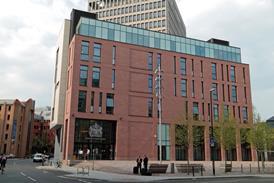Criminal barristers feeling increasingly overburdened with work but severely underpaid have told bar chiefs they have had enough and are prepared to take direct action.
Nearly all of the 2,050 barristers who prosecute responded to the Criminal Bar Association's survey on prosecution fees, the association said. When asked if they were prepared to take action - potentially up to and including no returns and days of action - 94.8% said yes. When asked if they believe the current remuneration rates for prosecution advocacy reflect the demands skill and responsibility the work involves, 99.3% said no.
The workload over the past five years had increased for 84.2% of respondents, with nearly all saying they were spending more time dealing with unused material.
Eight in 10 respondents said they did not feel valued by the Crown Prosecution Service.
CBA chair Chris Henley QC said: 'Our goodwill and professionalism has been abused for far too long. There have been no increases in fee levels for 20 years. You can spend a whole day at court presenting a serious and complex case for £46.50. It is beyond ridiculous. Or spend hours preparing a difficult sex case trial for £55.
'Far too many talented barristers are now refusing to work for the CPS. The answers to the CBA survey confirm why this is happening. They have had enough. It's great news for those who commit crime, but a disaster for victims of crime, and the wider public who want to be kept safe.'
The Gazette has been told that action could start as early as next month, starting with a series of one-day court walkouts.
Last month the FDA, a trade union for senior civil servants, announced it had secured a 10% pay rise for Crown prosecutors after arguing that its members should be 'properly compensated for extra work and greater flexibility'.
The CPS is reviewing the graduated fee schemes for external advocates.
Richard Atkins QC, chair of the Bar Council, said: 'I hope that the current review of prosecution fees will lead to a substantial increase in the fee levels which were originally set in 2001 and have not seen an increase since then. The CBA survey which has been responded to by a large number of those who prosecute demonstrates why change is necessary. I look forward to working with the CPS to produce a new and fair remuneration scheme.'
The CBA will shortly conduct a survey on defence fees.
Last year the government proposed to increase spending on the revised Crown court fee scheme for advocates by £15m after criminal barristers refused to accept new work for a number of weeks. Despite voting to accept the £15m, members of the criminal bar subsequently became angered at the delay in implementing the scheme, while the Law Society revealed that the proposals were actually worth only £8.6m.
Following further talks, Lord Chancellor David Gauke told the bar's annual conference that the government would be setting aside an additional £8m, bringing the total increase to £23m.

















![David Lester (senior partner at Blythe Liggins), Darryl Barnes, Jagdeep Sandher (head of dispute resolution at Blythe Liggins)[4]](https://d1d8vslyhr7rdg.cloudfront.net/Pictures/274x183/4/2/8/116428_davidlesterseniorpartneratblytheligginsdarrylbarnesjagdeepsandherheadofdisputeresolutionatblytheliggins4_981603_crop.jpg)






15 Readers' comments